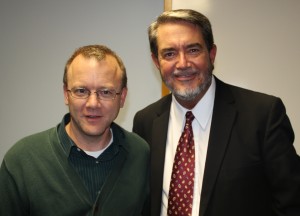A Generation
With each bank of hours, staring into oblivion, bending every pathway in my mind, hoping to find an undiscovered calculus, I arrived at the same unwelcome result. And then the calculations would start again dammit, each iteration lowering me further into a yawning darkness.
My mother would thrust her finger through my chest clear to the other side: “This too shall pass. This too shall pass.” I wanted to believe her words, spoken as both a hope and a declaration–like Gandalf at the bridge of Khazad-dûm shouting to the Balrog demon that played hell with me.
Every April 10, I recognize the anniversary of this misery; indulge me. I reckon it this day based on a peculiar memory: what must’ve been the largest one-a-day calendar ever, bolted to a wall, the number ten writ large upon the paper; and it was April. Assuming the staff was diligent about stripping off a billowing sheet each morning, then that was the day a tumor was removed from my neck. One week later I was diagnosed with cancer. I was a clueless runt all of fourteen and this was not exactly the growth spurt I was promised.
Such a diagnosis one decade earlier would have been fatal; but in 1980, before the Internet and the Fall of mighty Carthage, I stood an even chance. Chemotherapy was still a dark art and there was much uncertainty about her incantations. It was determined, after 6 months of treatment, a computerized coin flip would decide if another 12 months of the regimen was required. Why 12 and not simply another 6 was curiously never questioned. At any rate, this was a nation-wide study to determine dosage since the drugs had devastating, often deadly, side effects: Methotrexate is used as an abortifacient. Cytoxan can permanently sterilize. All of them interfere with metabolism and DNA duplication; add daily doses of radiation minus the x-ray vision and superpowers. It goes without saying that my tenuous dreams of being a rock star were thoroughly dashed, especially in the era of big hair bands. As one of the doctors presaged, I’d contract leukemia in my thirties should I survive so long.
My thirties? What did I care? That was an impossible and distant future for someone measuring his life in moments, like Antonius Block in the Swedish film Seventh Seal:
I shall remember this hour of peace… I shall remember our words and shall bear this memory between my hands…
I would pray, sometimes on my face: How can I hold the moments of life between my hands like a bowl of strawberries? Why do the seasons pass? Where are the years the locusts have eaten?
Back then, my mother, a woman of immense faith, protected me with the power of prayer. Her janky Plymouth Horizon made at the lowest point of American automotive innovation served as our chapel on wheels. Whenever we parked that car—often at some Gigeresque underground parking lot of a medical facility—Mom would pray over everything: me, the doctors, the nurses, the interns, the radiologists, the treatments; anyone and anything remotely associated with the circumstance. She would invoke the name of Jesus, quote scripture, denounce the Devil, and made sure that every spiritual and corporeal entity knew who, what, when, where, how, and why.
This activity was not confined to the lowly Detroit beater. As part of every round of chemotherapy, Mom would ask the luckless administering doctor if we could all pray first. No amount of medical school and gunshot wounds might have prepared him for such a thing. In any event the doctor would respectfully pause before injecting me with chilled chemicals that immediately filled my mouth and nostrils with the taste of moth crystals. Twelve hours later I’d be puking up my large intestine along with the foul hospital ravioli I had for lunch.
Hear, O my son, and receive my sayings; and the years of thy life shall be many. (Prov 4:10) [1]
My father, a man of blood and iron, probably preserved my life with a daring decision. Raised poor and fatherless in the Great Depression, Dad was the type of man who did what needed to be done despite sentiment or professional opinion. Be it bludgeoning an animal out of its misery or unceremoniously telling his teen-age son he’d lose all his hair, Dad did so without the luxury of introspection. Once when my brother managed to hammer a nail perfectly into his index finger, it was Dad who yanked it out with knuckle-white hands rather than rush to the hospital for careful diagnostic imaging. Only God knows how Joel managed an impossible self-impaling or how Dad deftly removed it without inflicting yubitsume.
After the required 6 months of therapy, it was determined by chthonian lottery that I should remain another 12 months more on chemotherapy: tails, bwa-ha-ha, you lose! When Mom and I were told this outcome on what was supposed to be my final day of treatment, I disintegrated. If that wasn’t bad enough, the new doctor on staff mistakenly informed us that 18 more months would be required (more supervillain laughter), dropping my heart into the sink of despair.
Years later, after my father passed away, I learned it was he who made the decision to discontinue treatment. Mom couldn’t deal with the dilemma. From her account, Dad merely called the oncologists as perfunctory as ordering a pepperoni pizza (always double cheese), informed them of his decision, hung up, and went back to work: heads, ha, I effing win!
Maybe. It was not until I was a parent that I understood the courage of that decision. Going against the recommendation of doctors, Dad took a tremendous risk. Had the cancer returned, it would have done so with more aggression and—well–good night dour prince. I have a difficult time imagining the weight of guilt that hung in the balance. Fast forward to this day and no one can dispute Dad’s decision.
My son, hear the instruction of thy father, and forsake not the law of thy mother: For they shall be an ornament of grace unto thy head, and chains about thy neck. (Prov 6:20)
And now, here I am, fifty plus, married, and the improbable father of two daughters. By this account, I am the richest man I know, for who may buy a single day, let alone forty years, with their wealth? As Mom hoped and declared, that too did pass and today, because of my mother and father, I have the luxury of introspection…
In antiquity, forty years was the measure of a generation and signified a period of testing. Jesus predicted the destruction of Jerusalem in “this generation” and exactly forty years later the Romans besieged the Holy City. Moses spent forty years in Egypt, forty years in exile, and another forty years in exodus. The children of Israel wondered the desert and ate manna for forty years. The first kings of Israel–Saul, David, Solomon–each reigned forty years. On its own, forty years portends a certain significance and meaning. Even the very date, 04-10-2020, reveal operands to calculations of forty, being also the 100th day of the common year.
But is it not more auspicious that this remarkable Ruby Jubilee falls on Great and Holy Friday? That exactly one generation later this experience would point to Christ’s crucifixion and the ultimate conquest of death and fear:
Behold! I tell you a mystery. We shall not all sleep, but we shall all be changed, in a moment, in the twinkling of an eye, at the last trumpet. For the trumpet will sound, and the dead will be raised imperishable, and we shall be changed… then shall come to pass the saying that is written: “Death is swallowed up in victory. O death, where is your victory? O death, where is your sting?” (1 Cor 15:51)
The lessons of that time can be brought to bear on our present pandemic and quarantine: part curse, part blessing. It is in these moments of testing we are asked to grow up and think about life with the utmost clarity; to take inventory of the moment and give thanks for what we have; discard the foolish, shallow, and banal; make restitution and reconciliation while the time is ever short; to ask if life is not more important than the multitude of things we worry about. To take courage in knowing that the Lover of Mankind is on our side and not opposed to us—so do not fear.[2]
This too shall pass. This too shall pass.
When you descended to death, O Immortal Life, You destroyed Hades by the splendor of your Divinity, and when you raised the dead from under the ground, all the Powers of heaven cried out: O Christ our God, the giver of life, glory to you. [3]
O Great and Holy Friday!
[1] Curiously, Prov 20:20 is “Whoso curseth his father or his mother, his lamp shall be put out in obscure darkness”.
[2] Ps 118:6
[3] Resurrection Troparion



